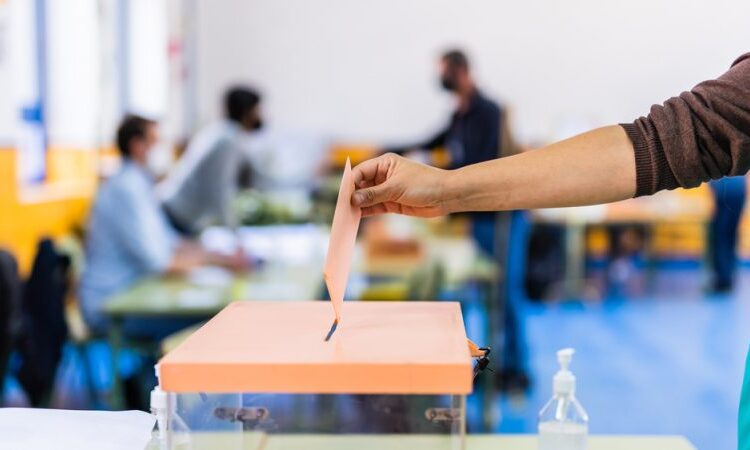
Europe is gearing up for seven elections next week, with key votes in Finland, Bulgaria and Montenegro, elections in Andorra, four French constituencies, and regional elections in Italy and Switzerland. EURACTIV’s partner Europe Elects provides you with the latest polls as well as analysis of the political context.
Finland: Finland’s parliamentary election is set to take place on Sunday, and the outcome will determine the political future of the country’s Prime Minister and European Council representative, Sanna Marin.
Current polls indicate that Marin’s coalition, consisting of her own Social Democratic Party (SDP), the Centre Party (Kesk), the Greens (Vihr), the Left (Vas), and the liberal Swedish People’s Party (SFP), is likely to maintain its majority. However, there is a possibility that the centre-right Kok (EPP Group in the EU Parliament) could emerge as the strongest party, replacing the social democrats.
Kok has long supported Finland’s membership in NATO, which may explain the party’s increased support compared to the previous election. On the other hand, the right-wing True Finns (PS) party, which is allied with Marine Le Pen’s Rassemblement National and Matteo Salvini’s Lega in the European Parliament, is expected to slightly improve its standing compared to the 2019 election, which could lead to PS having its strongest national parliament performance thus far.
Bulgaria: Bulgaria is holding its fifth snap election in less than two years on Sunday. Polls indicate that the ‘Continue Change–Democratic Bulgaria’ alliance is head-to-head with the centre-right GERB-SDS (EPP Group in the EU Parliament) alliance led by former prime minister Boyko Borissov. Both pro-European alliances poll at around 26%. The centrist DPS (Renew Europe in the EU Parliament) and the far-right pro-Putin party Vazrazhdane are polling third with about 13%, while the BSPzB alliance, affiliated with the S&D Group in the EU Parliament, is polling at only 8.0%, which would be their worst election result so far.
A path to a stable government remains uncertain, particularly as it is unclear whether Levitsata, ITN and the Bulgarian Rise party will make it across the 4% threshold. This election is unlikely to result in the desired breakthrough change for Bulgaria, which has struggled to form a lasting government coalition, leading to multiple snap elections since April 2021.
Montenegro: Voters are heading to the polls on Sunday in the second round of this year’s Presidential election, which could see the centre-left DPS party losing the office of the presidency for the first time. The centrist ‘Europe Now!’ Party candidate Jakov Milatović has a realistic chance of beating Milo Đukanović, who has been ruling the country as either president or prime minister for most of the time since 1990.
No polls have been published for the run-off, however, the candidate coming third in the first round, Andrija Mandić of the right-wing New Serb Party, had endorsed Milatović, who rejects ethnic narratives.
President Đukanović had dissolved parliament three days before the election’s first round after parties had failed to form a new government. A snap vote is scheduled for 11 June 2023.
Andorra: Voters in Andorra elect a new national parliament on 2 April. Polls in Andorra are rare and inaccurate due to low sample sizes of decided voters. The current government is led by the centre-right DA (2019: 35.1%), with the liberal LA (12.5%) and the newly formed liberal Acció party as junior coalition partners.
The centre-left PS-dominated alliance leads the opposition (PS: 30.6%; SDP: 5.9%). Two new parties could win significant vote shares: the environmentalist Concòrdia party and the ideologically diverse Endavant party.
The country is not a member of the European Union, but liberal and left-of-centre parties favour stronger ties with the bloc.
France: Amidst the ongoing pension reform protests, voters in four out of 577 constituencies head to the polls over the next weekend to elect a new MP for their electoral district.
Ariège’s 1st constituency in the South of France has historically been held by left-of-centre parties, which is unlikely to change this year: during the first round, which took already place last Sunday, all right-of-centre and liberal candidates were eliminated, with the incumbent LFI (Left) party candidate and a Socialist Party member (who is not officially endorsed by the party) advancing to the second round.
French voters living in Israel, Italy, Greece, Cyprus, Turkey, the Maghreb, Western Africa, the Caribbean, and Latin America are heading to the polls in the first round of a two-round contest to elect a total of three MPs. One seat is held by the centrist UDI party, one by the centre-left Génération·s party, and one by President Macron’s Renaissance party.
San Marino: In San Marino, a new head of state takes office every six months, a schedule that coincides with this weekend. Alessandro Scarano, who is the ‘Capitano reggente’-elect, is part of the Sammarinese Christian Democratic Party. The country is not a member of the EU.
Italy: Regional elections in Friuli Venezia-Giulia on Sunday and Monday are a test for the right-of-centre alliance of Prime Minister and European Council member Giorgia Meloni, whose national-conservative FdI (ECR) celebrated historic election results in past regional elections. However, much of this new support came from the right-wing Lega party (Identity and Democracy group in the EU Parliament) of Matteo Salvini or the centre-right Forza Italia (EPP Group in the EU Parliament) party of Silvio Berlusconi. No polls have been released. The right-of-centre Coalizione di Centro-destra alliance won 57.1% in the 2018 election; the centre-left PD-led coalition won 26.8%.
Switzerland: Geneva, Lucerne, and Ticino are electing new regional parliaments on Sunday. The votes are an important test for the parties ahead of the national parliament elections later this year. In Geneva and Lucerne, the first round of regional government elections also takes place. Most of Switzerland’s regions are distinct from other subnational entities in that regional government members are directly elected rather than by parliaments. (Europe Elects)






